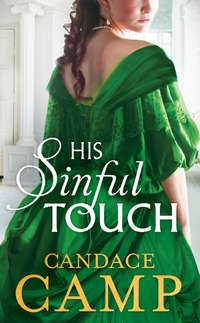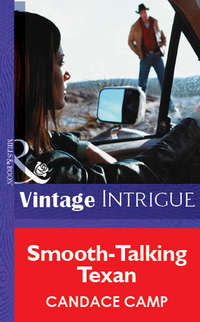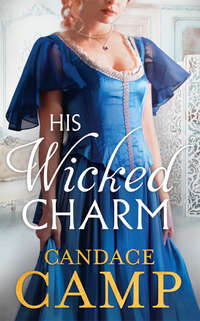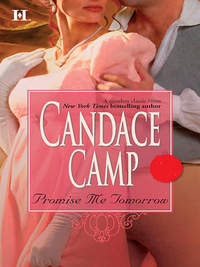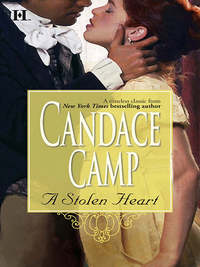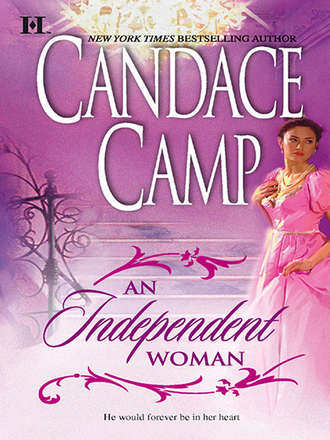
Полная версия
An Independent Woman
The older woman held up her hand peremptorily, saying, “Don’t think you can get around me, now, miss. You have overstepped your bounds, and that’s clear.”
“I beg your pardon?” Juliana had not expected Mrs. Thrall to be pleased with her, but this patently unreasonable charge got her back up.
“I’ll not have you working your wiles on men while you’re under my roof, I’ll have you know.”
“What?” Juliana stared at her employer, too stunned to think how to reply to this.
“Oh, don’t think I don’t know what you’re about,” Mrs. Thrall told her, nodding her head. “Clemmy is too innocent and naive to realize what you’ve been up to, but I’m not. I know what you did, how you seduced Lord Barre into taking you out alone—the promises you must have made. Where did you go while you were out?”
“How dare you?” Juliana shot back, her face utterly pale except for two furious spots of color that flared in her cheeks. “You have no reason to say such things about me! I would never—”
Mrs. Thrall waved away Juliana’s protests. “Oh, I know all right. Why else would a man choose to invite you and not my Clementine? It doesn’t take a genius to figure out the lures you were casting out…the sort of enticements that no man, even a gentleman, could resist. And I won’t have it, miss, not in my household, with two impressionable young girls here.”
“Mama! No!” Fiona gasped from where she stood at the doorway to the drawing room, watching the scene unfold before her.
Juliana stalked forward to Mrs. Thrall, towering over the squat woman. She had managed over the years to hold her temper under all sorts of provocation, but this accusation was too much for her.
“There has never been the slightest stain on my name,” Juliana said fiercely, her voice trembling with the force of her indignation. “My reputation is unblemished.”
“Hah!” Clementine responded. “Mama has the right of it. You knew that he admired me, and you seduced him into taking you for a ride.”
“Don’t be any more foolish than you already are, Clementine,” Juliana snapped, the words tumbling out of her. “Nicholas did not admire you. He didn’t even know who you were. He was my friend from many years ago, and he asked me to go out with him in his curricle because he wanted to talk with me. And he did not ask you to go because he didn’t want you to. Not every man in the world is going to fall at your feet.”
Before Clementine could do anything more than gape at her, mouth opening and closing like a fish, Juliana swung toward her mother. “And as for casting out lures or staining her precious reputation, I would suggest that you look toward your daughter first. Clementine is an outrageous flirt, and I have to keep my eye on her the entire time at every ball to make sure she does not slip out onto the terrace with any man who asks her. If you don’t put some reins on her, she is going to come a cropper, and I can assure you that if she makes a serious misstep, she will be ruined in Society. And no amount of beauty will overcome that. However attractive she might be, any closer acquaintance with her will show just how spoiled, selfish, vain and foolish Clementine is, with the result that over the course of time, a great number of her conquests will drop away. If you expect her to marry well, you had better make sure that she is the sort of girl that a gentleman’s mother will accept as a daughter-in-law, not just the sort of beauty that callow youths dangle after.”
Juliana stopped and drew a long breath, a great sense of calm falling over her. She realized that she had doubtless just lost her position there, but she could not regret it…at least, not just yet. She was too filled with a sense of well-being at having at last been able to express her true feelings.
“Leave this house!” Mrs. Thrall rasped, rage suffusing her face. “Right now! Do you hear me?”
“Gladly,” Juliana responded, stepping around the woman and starting up the stairs.
“And don’t expect any reference from me!” Mrs. Thrall called after her.
“I wouldn’t dream of it.” Juliana continued up the stairs and down the hall to her room. Behind her, she heard Fiona run past her sister and mother and up the stairs after her.
“Miss Holcott! Wait!” Fiona called.
Juliana turned at the door of her room and looked back at the girl. She felt a twinge of regret when she saw Fiona’s unhappy face.
“Please do not leave, Miss Holcott,” Fiona went on, drawing close to her.
“I am sorry. I have no choice. I’m afraid your mother has let me go.” Juliana turned the doorknob and went into her room.
Fiona trailed after her. “She is just angry. She will calm down, and then I am sure she will regret it.”
“I’m not so sure, after what I said.” Juliana looked down at Fiona, then sighed and said, “I am sorry. I should not have said what I did about your sister.”
“No.” Fiona stood and watched as Juliana opened the small chest at the foot of her bed and began to fill it with clothes from her drawers. “I am afraid you are right. Clementine is a very silly creature, and quite selfish. And you should not have to endure her scolding you because Lord Barre did not fall at her feet. I hate to see you go.”
“I shall miss you, as well,” Juliana assured the girl honestly, then went over to curl an arm around Fiona’s shoulders affectionately. “Perhaps your mother will let you visit me sometime.”
“Perhaps,” Fiona replied doubtfully. “Where will you go?”
Juliana realized that she had not even thought about where she would go or what she would do now. She had indeed acted hastily. Still, she could not regret it.
“I think I will go to my friend’s house. Eleanor Townsend—well, Lady Scarbrough now, since she has married. Here,” she said, turning and taking a pencil from her pocket, and a piece of paper from one of the dresser drawers. “I shall write down her address for you, so that you may come to see me. We went to school together, and she has always extended me an open invitation to stay with her.”
It did not take long to pack her belongings, and Juliana was soon ready to leave. She rang for a footman to carry down her trunk, then turned and hugged Fiona goodbye.
The girl’s eyes filled with tears, and Juliana felt a tug at her own heartstrings. Even though she had been here only a few months, she had developed a deep fondness for Fiona.
“I will come see you,” Fiona promised, her voice muffled against Juliana’s shoulder. “Even if I have to sneak out of the house.”
“Don’t get into any trouble,” Juliana told her. She knew that the “right” thing to tell the girl was to obey her mother, but she was also quite sure that Fiona was far smarter than Mrs. Thrall and better able to judge what should be done.
Juliana left quickly after that, picking up her small bag and going lightly down the backstairs to bid farewell to the household staff. When she came around to the front of the house, she found that the footman who had carried her trunk downstairs had already hailed a hack for her and strapped her trunk on the back of it. He helped her up into the cab, closing the door after her, and the vehicle rattled off.
Here she was, once again, without employment and with no prospect of any. Juliana leaned back with a sigh against the seat, and for the first time in the last two hours thought about her situation.
It was then that she realized Nicholas no longer knew where she was.
CHAPTER FIVE
LADY SCARBROUGH’S HOUSE was an elegant white Queen Anne-style mansion that took up a good third of one of the most fashionable blocks in Mayfair. As Juliana climbed down from the carriage, she heard the driver let out a low whistle, and he hopped down to get his money, tipping his hat to her more respectfully than he had when she got into his vehicle.
While he removed her trunk from the back of the cab, Juliana walked up to the door and used the large brass knocker. The door was opened a moment later by a short, square man with the misshapen ears and oft-broken nose that betokened a bare-knuckle fighter. He was not the sort of person one expected for a footman and even less for the butler who ran the household, but Juliana knew that was his position. Like many of her friend Eleanor’s employees, he was unorthodox, competent and intensely loyal.
“Miss Holcott!” he said now, his rough face lightening into a grin. “It’s good to see you. Miss Eleanor will be so happy. Come in, come in.”
“Hello, Bartwell,” Juliana replied, following him inside and handing him the small bag she carried. “Sorry to arrive on the doorstep this way. I hadn’t time to send Miss—I mean, Lady Scarbrough—a note.”
“Never worry about that, miss. There’s always a room ready for you,” he assured her, then turned to say to a young man approaching them from the rear of the house, “You, Fletcher, get the young lady’s trunk and take it up to the blue bedchamber.”
Like Bartwell, Fletcher was dressed in neat black and white, but he did not wear livery, another oddity of Eleanor’s servants. They were a mixture of nationalities, Bartwell American like Eleanor herself, as was Eleanor’s personal maid, while Fletcher and most of the other servants were English, and the cook was decidedly French.
The servants were not the only oddities about Eleanor’s household. She was in the habit of helping others—indeed, there were some caustic souls who deemed her an inveterate meddler—and she had in the course of the past few years acquired two orphaned children, one an energetic young French girl named Claire and the other an American lad named Seth, as well as a young woman from India whom Eleanor had rescued from being thrown on a funeral pyre along with her dead husband, and who had become the children’s nanny. Her business manager was a well-spoken black man whom Eleanor’s father had bought out of slavery and sent to school. It made for a lively and sometimes noisy household, but everyone in it was devoted to Eleanor.
“Miss Eleanor is in her study,” Bartwell told her. It was clear, Juliana thought, that despite her marriage to Sir Edmund, Eleanor would never be Lady Scarbrough to Bartwell, but always the Miss Eleanor she had been since he had been employed by her father when Eleanor was only a child. “Would you like me to take you to her, or would you prefer that I show you to your room, so that you may freshen up?”
Juliana replied that she would see Eleanor first, feeling it incumbent upon her to at least go through the formality of asking to stay, even though she knew her friend would never think of refusing her hospitality.
She and Eleanor had been friends for twelve years, and despite the different paths their lives had taken and their frequent separations, their friendship was still as fast as it had been from the first. They had met at the finishing school to which Juliana had been sent with Seraphina Barre. It had been the intention of Seraphina’s parents that Juliana watch over the girl, helping her with her studies, as she often needed, and making sure that she didn’t get into any scrapes. Seraphina had accepted Juliana’s help as her due, but she had not considered her a bosom friend. That position was reserved for other girls of similar wealth and consequence.
Juliana was, therefore, left largely alone at the school by Seraphina and her group, as well as by most of the other students. All were aware that Juliana’s friendship would do nothing to improve their position in Society. But she had quickly become friends with another girl who was also considered an outsider. Eleanor Townsend, although very wealthy, was an American and, according to the general opinion at the Miss Blanton School for Girls, decidedly odd. Juliana, of course, had liked her immediately.
As Bartwell led Juliana down the hall to Eleanor’s study, she heard the sound of a piano being played, the music ending abruptly, starting again hesitantly, then stopping.
“Sir Edmund is in the music room,” Bartwell explained in an aside. “Composing.”
Juliana nodded. She did not know Eleanor’s husband well. Eleanor had married him only two months earlier, in a small wedding that Juliana had attended. He was a slender, quiet man who seemed, as best Juliana could tell, to live on the periphery of Eleanor’s life. When she had called at the house since the marriage, Sir Edmund had usually been sequestered in the music room or upstairs in his bedroom, nursing another of the coughs and fevers that apparently plagued him. He was a musical genius, Eleanor had assured her, and Juliana sometimes wondered if Eleanor had not married him simply to make sure that his life was properly managed, allowing him to occupy himself with his music and not worry about other, lesser, things such as food or medicine or bills being paid.
Managing things was, after all, what Eleanor did best.
Bartwell tapped on the study door, then opened it at Eleanor’s reply. “Miss Holcott is here to see you, ma’am.”
Конец ознакомительного фрагмента.
Текст предоставлен ООО «ЛитРес».
Прочитайте эту книгу целиком, купив полную легальную версию на ЛитРес.
Безопасно оплатить книгу можно банковской картой Visa, MasterCard, Maestro, со счета мобильного телефона, с платежного терминала, в салоне МТС или Связной, через PayPal, WebMoney, Яндекс.Деньги, QIWI Кошелек, бонусными картами или другим удобным Вам способом.


